|
Here's
a Savvy RV Secret: |
|
| Are high fuel prices curbing your RV travels? There's a way to enjoy all the benefits of RVing -- and help pay for your travels. Jaimie Hall Bruzenak tells you how. |
My late husband, Bill, and I spent two summers enjoying the RV lifestyle in Skagway, Alaska -- and we left with more money than we'd brought. We did the same in the Grand Tetons and at Lake Powell. How did we do this? We worked while we were there. Working on the road made our RV travels not only affordable but also rich in many other ways.
|
It doesn't even have to be paid work. Volunteering can also help the budget, especially in public parks, where volunteers can often get a free RV site in exchange for so many hours of service (in federal parks, 32 hours are usually required). Occasionally volunteers will get free propane or a stipend. The money you save on your RV site can then be used to pay for gas and other expenses.
Working or volunteering can save money in several ways:
Fuel costs.
Once you arrive at your work location, your RV is parked for up to six months. Even allowing for some on-road exploration, your total mileage will probably be less than if you traveled the whole time. And you'll be using your toad (towed vehicle) or your tow vehicle alone to sightsee. Tow vehicles generally get better fuel mileage when not towing, and your toad definitely gets better mileage than your motorhome!
Recreation costs.
You can choose to work or volunteer in an area where you want to explore. In some locations you can practically step outside your door to hike, bike or take photos, and state and federal parks often offer free programs. Private RV parks may also offer activities and be within a short drive of things to do.
For example, working at Ruby's Inn outside Bryce Canyon, a fellow RVer named Susan had four national parks within an easy drive and several others in southern Utah she could visit on an overnight trip. Cedar City had a Shakespeare Festival and a Neil Simon Festival. Panguitch, 24 miles away, had many summer events and a library. At Lake Powell, employees of the concessionaire can use boats when they are available, paying only gas and insurance.
Perks.
Many RV parks offer or have access to perks for employees. The employer may offer free or discounted laundry, propane, activities or meals. Some employers organize employee trips and activities -- and foot the bill. Perks like these reduce the amount of money you would otherwise spend.
Nearby attractions sometimes offer free tickets to RV park employees in hopes they will tell their RV guests about the attractions. You may also get discounts at local restaurants and stores if you ask. Amusement parks often let their employees in free when they aren't working a shift. An RV couple working at Busch Gardens in Tampa, Fla., each received six tickets for their guests after working there only one month.
Here are some of the perks I've heard of from RV friends who work on the road: a free glacier flight-seeing tour; free admission to all the shows in Branson, Missouri; eligibility for the Local's Day price on the White Pass & Yukon Route Railway; free golf when tee times are available; a free raft trip below the Glen Canyon dam; and discounts on rafting the Grand Canyon. And that's just to name a few.
And here's a big benefit: If you volunteer at least 500 hours at an eligible federal recreational site, you are eligible for a Volunteer Pass that gets you free admission to all national parks and federal recreational sites for a full year.
Easy to save. If you are in a remote area, there might not be much to spend your money on - especially if you have free or discounted recreation. With no Wal-Mart or tourist shops nearby, it's easy to save. Plus, with limited space in their rigs, most RVers are content with a new T-shirt, photos and perhaps some postcards to send to the grandkids. After all, the experiences and the memories are the most treasured mementos.
Other benefits.
Besides saving money and perhaps adding to your bank account, working or volunteering has other benefits.
First, you have time to experience an area in depth. Using your workplace as a base, you can explore the surrounding areas on days off. Locals may tell you about things that tourists rarely, if ever, see -- things like hidden petroglyphs and remote ghost towns. After being sworn to secrecy, Bill and I were directed to a kiva with its original roof intact. It wasn't in the guidebooks or on the maps. On a work-stay, you have time to see more things. The tourist may visit for a day or two; you have all season.
Second, you are part of a community, even if for a limited time. You can participate in events, clubs and other activities that are hit-and-miss for the tourist. While in Skagway, I marched in the Fourth of July parade with a line-dance group after practicing several weeks beforehand. While there, I even learned to play the Autoharp with a Gold Rush descendent, performing with her on several occasions at the national park visitor center.
Third, you might make lasting friendships with coworkers and locals. I still keep in contact with my first boss and his wife in the Grand Tetons, stopping off to see them many years later in Kansas, where he transferred.
And best of all, working and volunteering gives you the chance to try something new or fun. Janice was the weather girl for a ski resort, calling in the local ski conditions and weather to radio stations each morning. Phyllis played Calamity Jane in the "Trial of Jack McCall" in Deadwood, S.D. Sue got paid to talk to people all day at Disney World, walking around with a "character" helping visitors get photos and autographs. Jack was right down on the track at a NASCAR race.
If your budget is taking a hit from fuel prices, finding a place to work or volunteer could be the way to afford your travels and build your account back up. It could also be the way to add to your experiences and lead to unique adventures -- adventures you write home about, the kind of adventures money just can't buy.
Jaimie Hall-Bruzenak
3/14/08

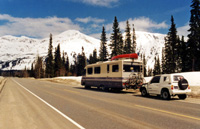
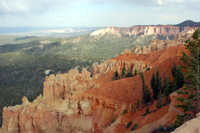
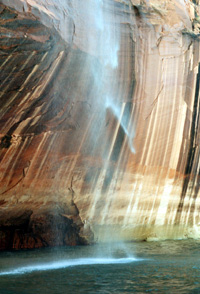
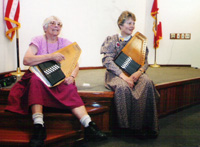
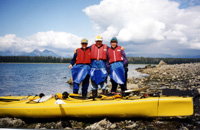
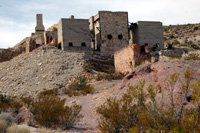
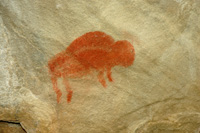
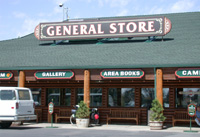
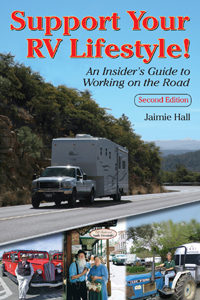 Support
Your RV Lifestyle! An Insider's Guide to Working
on the Road
Support
Your RV Lifestyle! An Insider's Guide to Working
on the Road